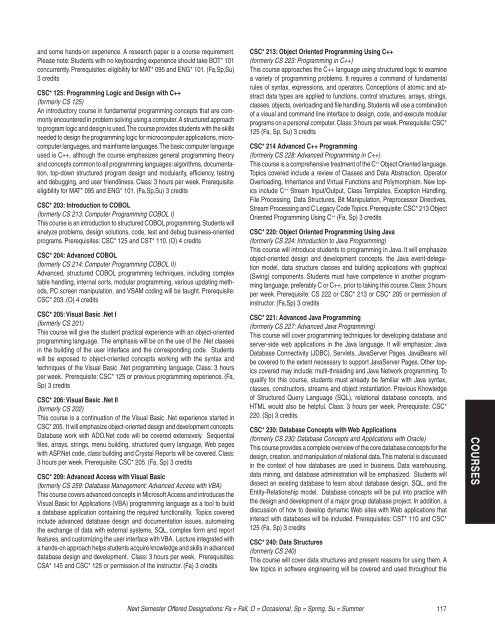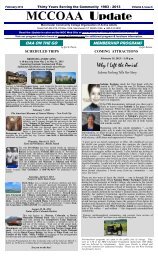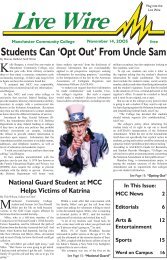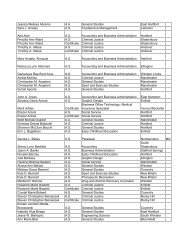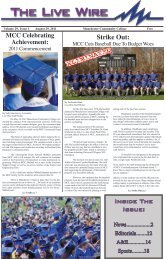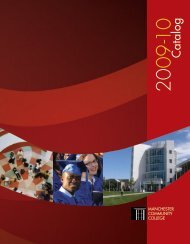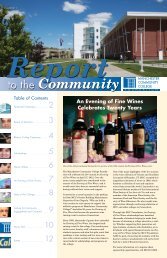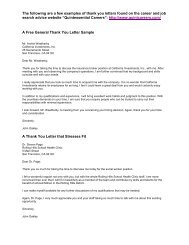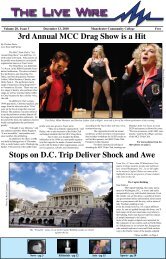Liberal Arts and Science - Manchester Community College ...
Liberal Arts and Science - Manchester Community College ...
Liberal Arts and Science - Manchester Community College ...
Create successful ePaper yourself
Turn your PDF publications into a flip-book with our unique Google optimized e-Paper software.
<strong>and</strong> some h<strong>and</strong>s-on experience. A research paper is a course requirement.<br />
Please note: Students with no keyboarding experience should take BOT* 101<br />
concurrently. Prerequisites: eligibility for MAT* 095 <strong>and</strong> ENG* 101. (Fa,Sp,Su)<br />
3 credits<br />
CSC* 125: Programming Logic <strong>and</strong> Design with C++<br />
(formerly CS 125)<br />
An introductory course in fundamental programming concepts that are commonly<br />
encountered in problem solving using a computer. A structured approach<br />
to program logic <strong>and</strong> design is used. The course provides students with the skills<br />
needed to design the programming logic for microcomputer applications, microcomputer<br />
languages, <strong>and</strong> mainframe languages. The basic computer language<br />
used is C++, although the course emphasizes general programming theory<br />
<strong>and</strong> concepts common to all programming languages: algorithms, documentation,<br />
top-down structured program design <strong>and</strong> modularity, efficiency, testing<br />
<strong>and</strong> debugging, <strong>and</strong> user friendliness. Class: 3 hours per week. Prerequisite:<br />
eligibility for MAT* 095 <strong>and</strong> ENG* 101. (Fa,Sp,Su) 3 credits<br />
CSC* 203: Introduction to COBOL<br />
(formerly CS 213: Computer Programming COBOL I)<br />
This course is an introduction to structured COBOL programming. Students will<br />
analyze problems, design solutions, code, test <strong>and</strong> debug business-oriented<br />
programs. Prerequisites: CSC* 125 <strong>and</strong> CST* 110. (O) 4 credits<br />
CSC* 204: Advanced COBOL<br />
(formerly CS 214: Computer Programming COBOL II)<br />
Advanced, structured COBOL programming techniques, including complex<br />
table h<strong>and</strong>ling, internal sorts, modular programming, various updating methods,<br />
PC screen manipulation, <strong>and</strong> VSAM coding will be taught. Prerequisite:<br />
CSC* 203. (O) 4 credits<br />
CSC* 205: Visual Basic .Net I<br />
(formerly CS 201)<br />
This course will give the student practical experience with an object-oriented<br />
programming language. The emphasis will be on the use of the .Net classes<br />
in the building of the user interface <strong>and</strong> the corresponding code. Students<br />
will be exposed to object-oriented concepts working with the syntax <strong>and</strong><br />
techniques of the Visual Basic .Net programming language. Class: 3 hours<br />
per week. Prerequisite: CSC* 125 or previous programming experience. (Fa,<br />
Sp) 3 credits<br />
CSC* 206: Visual Basic .Net II<br />
(formerly CS 202)<br />
This course is a continuation of the Visual Basic .Net experience started in<br />
CSC* 205. It will emphasize object-oriented design <strong>and</strong> development concepts.<br />
Database work with ADO.Net code will be covered extensively. Sequential<br />
files, arrays, strings, menu building, structured query language, Web pages<br />
with ASP.Net code, class building <strong>and</strong> Crystal Reports will be covered. Class:<br />
3 hours per week. Prerequisite: CSC* 205. (Fa, Sp) 3 credits<br />
CSC* 209: Advanced Access with Visual Basic<br />
(formerly CS 259: Database Management: Advanced Access with VBA)<br />
This course covers advanced concepts in Microsoft Access <strong>and</strong> introduces the<br />
Visual Basic for Applications (VBA) programming language as a tool to build<br />
a database application containing the required functionality. Topics covered<br />
include advanced database design <strong>and</strong> documentation issues, automating<br />
the exchange of data with external systems, SQL, complex form <strong>and</strong> report<br />
features, <strong>and</strong> customizing the user interface with VBA. Lecture integrated with<br />
a h<strong>and</strong>s-on approach helps students acquire knowledge <strong>and</strong> skills in advanced<br />
database design <strong>and</strong> development. Class: 3 hours per week. Prerequisites:<br />
CSA* 145 <strong>and</strong> CSC* 125 or permission of the instructor. (Fa) 3 credits<br />
CSC* 213: Object Oriented Programming Using C++<br />
(formerly CS 223: Programming in C++)<br />
This course approaches the C++ language using structured logic to examine<br />
a variety of programming problems. It requires a comm<strong>and</strong> of fundamental<br />
rules of syntax, expressions, <strong>and</strong> operators. Conceptions of atomic <strong>and</strong> abstract<br />
data types are applied to functions, control structures, arrays, strings,<br />
classes, objects, overloading <strong>and</strong> file h<strong>and</strong>ling. Students will use a combination<br />
of a visual <strong>and</strong> comm<strong>and</strong> line interface to design, code, <strong>and</strong> execute modular<br />
programs on a personal computer. Class: 3 hours per week. Prerequisite: CSC*<br />
125 (Fa, Sp, Su) 3 credits<br />
CSC* 214 Advanced C++ Programming<br />
(formerly CS 228: Advanced Programming in C++)<br />
This course is a comprehensive treatment of the C ++ Object Oriented language.<br />
Topics covered include a review of Classes <strong>and</strong> Data Abstraction, Operator<br />
Overloading, Inheritance <strong>and</strong> Virtual Functions <strong>and</strong> Polymorphism. New topics<br />
include C ++ Stream Input/Output, Class Templates, Exception H<strong>and</strong>ling,<br />
File Processing, Data Structures, Bit Manipulation, Preprocessor Directives,<br />
Stream Processing <strong>and</strong> C Legacy Code Topics. Prerequisite: CSC* 213 Object<br />
Oriented Programming Using C ++ (Fa, Sp) 3 credits<br />
CSC* 220: Object Oriented Programming Using Java<br />
(formerly CS 224: Introduction to Java Programming)<br />
This course will introduce students to programming in Java. It will emphasize<br />
object-oriented design <strong>and</strong> development concepts, the Java event-delegation<br />
model, data structure classes <strong>and</strong> building applications with graphical<br />
(Swing) components. Students must have competence in another programming<br />
language, preferably C or C++, prior to taking this course. Class: 3 hours<br />
per week. Prerequisite: CS 222 or CSC* 213 or CSC* 205 or permission of<br />
instructor. (Fa,Sp) 3 credits<br />
CSC* 221: Advanced Java Programming<br />
(formerly CS 227: Advanced Java Programming)<br />
This course will cover programming techniques for developing database <strong>and</strong><br />
server-side web applications in the Java language. It will emphasize: Java<br />
Database Connectivity (JDBC), Servlets, JavaServer Pages. JavaBeans will<br />
be covered to the extent necessary to support JavaServer Pages. Other topics<br />
covered may include: multi-threading <strong>and</strong> Java Network programming. To<br />
qualify for this course, students must already be familiar with Java syntax,<br />
classes, constructors, streams <strong>and</strong> object instantiation. Previous Knowledge<br />
of Structured Query Language (SQL), relational database concepts, <strong>and</strong><br />
HTML would also be helpful. Class: 3 hours per week. Prerequisite: CSC*<br />
220. (Sp) 3 credits.<br />
CSC* 230: Database Concepts with Web Applications<br />
(formerly CS 230: Database Concepts <strong>and</strong> Applications with Oracle)<br />
This course provides a complete overview of the core database concepts for the<br />
design, creation, <strong>and</strong> manipulation of relational data. This material is discussed<br />
in the context of how databases are used in business. Data warehousing,<br />
data mining, <strong>and</strong> database administration will be emphasized. Students will<br />
dissect an existing database to learn about database design, SQL, <strong>and</strong> the<br />
Entity-Relationship model. Database concepts will be put into practice with<br />
the design <strong>and</strong> development of a major group database project. In addition, a<br />
discussion of how to develop dynamic Web sites with Web applications that<br />
interact with databases will be included. Prerequisites: CST* 110 <strong>and</strong> CSC*<br />
125 (Fa, Sp) 3 credits<br />
CSC* 240: Data Structures<br />
(formerly CS 240)<br />
This course will cover data structures <strong>and</strong> present reasons for using them. A<br />
few topics in software engineering will be covered <strong>and</strong> used throughout the<br />
Next Semester Offered Designations: Fa = Fall, O = Occasional, Sp = Spring, Su = Summer 117<br />
COURSES


